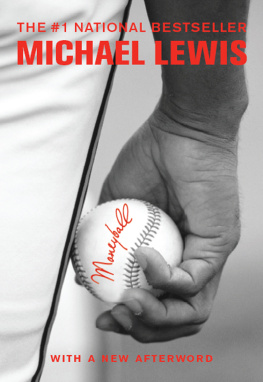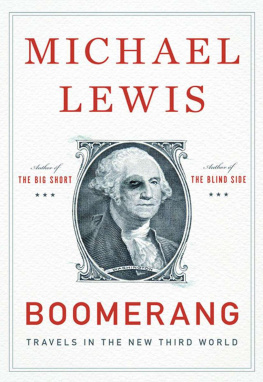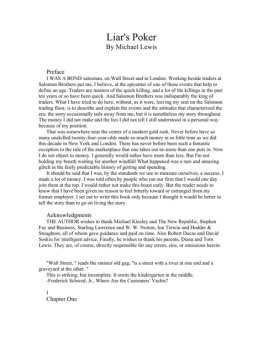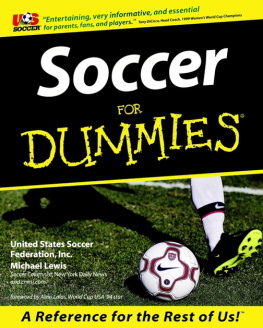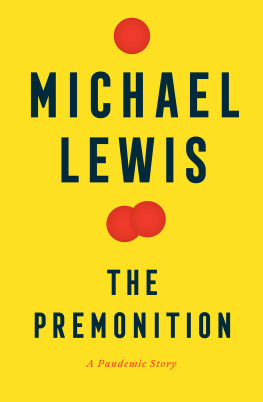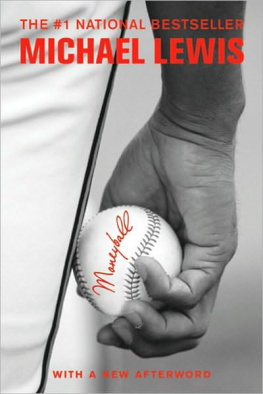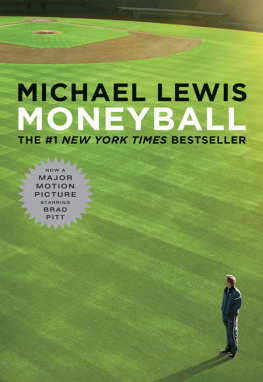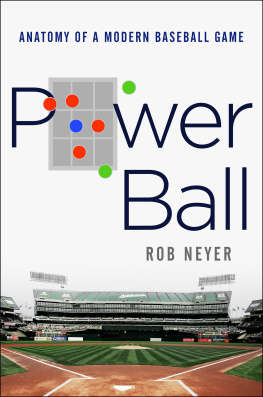Further Praise for MONEYBALL
Ebullient, invigorating. Provides plenty of action, both numerical and athletic, on the field and in the draft-day war room.
Lev Grossman, Time
By playing Boswell to Beanes Samuel Johnson, Lewis has given us one of the most enjoyable baseball books in years.
Lawrence S. Ritter, New York Times Book Review
A journalistic tour de force.
Richard J. Tofel, Wall Street Journal
A brilliantly told tale. Michael Lewiss beautiful obsession with the idea of value has once again yielded gold. Moneyball explains baseballs startling new insight; that for all our dreams of blasts to the bleachers, the sports hidden glory lies in not getting out.
Garry Trudeau
Amazing anecdotesan entertaining, enlightening read.
Will Lingo, Baseball America
This delightfully written, lesson-laden book deserves a place of its own in the Baseball Hall of Fame.
Rich Karlgaard, Forbes
An extraordinary job of reporting and writing.
Mark Emmons, San Jose Mercury News
Anyone who cares about baseball must read it.
Cathleen McGuigan, Newsweek
Michael Lewis has written what might be the best book ever about baseball.
Steve Weinberg, Orlando Sentinel
Lewis has a wonderful story to tell, and he tells it wonderfully.
Richard H. Thaler and Cass R. Sunstein, The New Republic
[Lewiss] descriptive writing allows Beane and the others in the lively cast of baseball characters to come alive.
Publishers Weekly
Lewiss book is a thoroughly modern, entertainingeven revolutionary look at the way the game has changed and is changingguaranteed to ruffle a lot of feathers.
Brad Zellar, Minneapolis Star Tribune
This book is as much for people who take joy in new ideas as in games.
Brian ONeill, Pittsburgh Post-Gazette
Engaging, informative and deliciously contrarian.
Jonathan Yardley, Washington Post
Lewis is a five-tool reporter: He can think, joke, characterize, write for average readers and write for powerful decision makers.
David Kipen, San Francisco Chronicle
Lewis has managed to put together a compelling inside-baseball book that skewers many of the sports longstanding sacred cows.
Carol Knopes, USA Today
Lewiss glee about the depth of baseballs irrationality has plenty to say to anyone whos human. He rises to Jamesean heights in describing the difference between Beanes view of baseball talent and the rest of baseballs.
Marta Salij, Detroit Free Press
This insightful volume refutes the conventional wisdom of veteran baseball men and celebrates an underdog.
David Lieberfarb, Newark Star Ledger
I understood about one in four words of Moneyball , and its still the best and most engrossing sports book Ive read for years. If you know anything about baseball, you will enjoy it four times as much as I did, which means that you might explode.
Nick Hornby, The Believer
Fantastically informative and entertainingbound to excite extreme envy.
Josh Benson, New York Observer
Open this bookand your mind.
Nat Newell, Columbia, South Carolina, State
ALSO BY MICHAEL LEWIS
Liars Poker
The Money Culture
Pacific Rift
Losers
The New New Thing
Next
MONEYBALL
The Art of Winning an Unfair Game
MICHAEL LEWIS

W. W. NORTON & COMPANY
NEW YORK LONDON
Copyright 2004, 2003 by Michael Lewis
All rights reserved
First published as a Norton 2004
For information about permission to reproduce selections from this book, write to Permissions, W. W. Norton & Company, Inc., 500 Fifth Avenue, New York, NY 10110
Library of Congress Cataloging-in-Publication Data
Lewis, Michael (Michael M.)
Moneyball: the art of winning an unfair game / by Michael Lewis.
1st ed.
p. cm.
ISBN: 978-0-393-06740-8
1. BaseballEconomic aspectsUnited States. 2. BaseballScoutingUnited States. 3. Baseball playersSalaries, etc.United States. I. Title.
GV880.L49 2003
796.357'06'91
2003005089
W. W. Norton & Company, Inc.
500 Fifth Avenue, New York, N.Y. 10110
www.wwnorton.com
W. W. Norton & Company Ltd.
Castle House, 75/76 Wells Street, London W1T 3QT
9 0
For Billy Fitzgerald
I can still hear him shouting at me
CONTENTS
Lately in a wreck of a Californian ship, one of the passengers fastened a belt about him with two hundred pounds of gold in it, with which he was found afterwards at the bottom. Now, as he was sinkinghad he the gold? or the gold him?
John Ruskin, Unto This Last
PREFACE
I WROTE THIS BOOK because I fell in love with a story. The story concerned a small group of undervalued professional baseball players and executives, many of whom had been rejected as unfit for the big leagues, who had turned themselves into one of the most successful franchises in Major League Baseball. But the idea for the book came well before I had good reason to write itbefore I had a story to fall in love with. It began, really, with an innocent question: how did one of the poorest teams in baseball, the Oakland Athletics, win so many games?
For more than a decade the people who run professional baseball have argued that the game was ceasing to be an athletic competition and becoming a financial one. The gap between rich and poor in baseball was far greater than in any other professional sport, and widening rapidly. At the opening of the 2002 season, the richest team, the New York Yankees, had a payroll of $126 million while the two poorest teams, the Oakland As and the Tampa Bay Devil Rays, had payrolls of less than a third of that, about $40 million. A decade before, the highest payroll team, the New York Mets, had spent about $44 million on baseball players and the lowest payroll team, the Cleveland Indians, a bit more than $8 million. The raw disparities meant that only the rich teams could afford the best players. A poor team could afford only the maimed and the inept, and was almost certain to fail. Or so argued the people who ran baseball.
And I was inclined to concede the point. The people with the most money often win. But when you looked at what actually had happened over the past few years, you had to wonder. The bottom of each division was littered with teamsthe Rangers, the Orioles, the Dodgers, the Metsthat had spent huge sums and failed spectacularly. On the other end of the spectrum was Oakland. For the past several years, working with either the lowest or next to lowest payroll in the game, the Oakland As had won more regular season games than any other team, except the Atlanta Braves. Theyd been to the play-offs three years in a row and in the previous two taken the richest team in baseball, the Yankees, to within a few outs of elimination. How on earth had they done that? The Yankees, after all, were the most egregious example of financial determinism. The Yankees understood what New York understood, that there was no shame in buying success, and maybe because of their lack of shame they did what they did better than anyone in the business.
As early as 1999, Major League Baseball Commissioner Allan H. (Bud) Selig had taken to calling the Oakland As success an aberration, but that was less an explanation than an excuse not to grapple with the question: howd they do it? What was their secret? How did the second poorest team in baseball, opposing ever greater mountains of cash, stand even the faintest chance of success, much less the ability to win more regular season games than all but one of the other twenty-nine teams? For that matter, what was it about baseball success that resisted so many rich mens attempt to buy it? These were the questions that first interested me, and this book seeks to answer.

